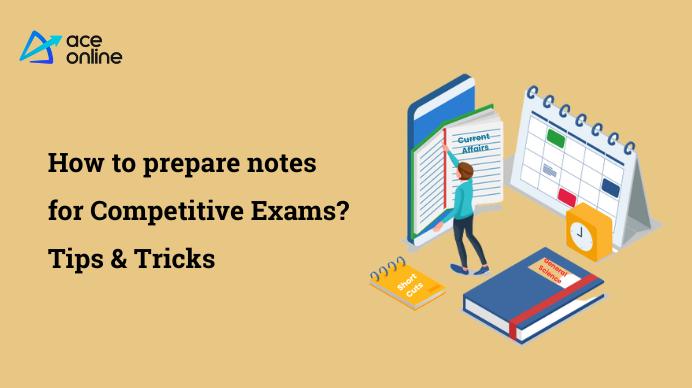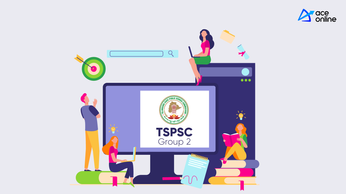
How to prepare notes for Competitive Exams? Tips & Tricks
Best preparation and effective note-taking is a crucial aspect of achieving success in competitive exams. Whether you are gearing up for entrance examinations, aptitude tests, or any other competitive exams, the ability to organize and retain information through well-prepared notes can make a significant difference. By condensing vast amounts of information into concise and easily accessible formats, you not only enhance your understanding but also facilitate efficient revision. This guide will provide you with valuable tips and tricks on how to prepare notes for competitive exams, helping you optimize your study approach, boost your retention, and ultimately enhance your chances of acing those important tests. So, let's delve into the world of effective note-taking strategies and unlock your potential for exam success.
A recent study found that a two-hour lecture needs to be read for at least six hours in order to fully absorb it into the brain. This is absolutely true for science subjects. We should be fully prepared for this. The notes that we make ourselves in the exam preparation are very useful for this.
Making notes on our own is the best way to understand the subjects with concepts, concepts, and analysis more easily. It is even better to take notes while studying the lesson. How to create notes from time to time? Before knowing this, let us know what are the benefits of taking actual notes.
Benefits of Preparing Own Notes
Re-reading the notes will give you a clearer idea of what the important points are. The contents of notes made by oneself are remembered for a long time. If you refer to a textbook or workbook or study material during exams, it will be easy to understand as it is all written in notes earlier.
What are the methods of note taking?
Students should write notes in their own style. Only then will it be remembered. A few tips can be followed while taking notes. Notes should be as brief as possible. If you have mastery over the language, you can use more phrases and words. That is, there is no need to write a sentence if the phrase fits. There is no need to write a phrase if the word fits. Abbreviations and symbols should be used wherever necessary. But we should use symbols that we know well and remember. As far as possible the notes we take should be in our own words. We need to understand them when we read them again. Formulas and definitions must be complete. Changing or compressing them is not correct.
How to Make an effective notes?
Organize Your Notes:
One of the first steps in effective note-taking is to establish a clear organizational system. Start by creating separate sections or notebooks for different subjects or topics. This allows for easy retrieval of information and prevents confusion during revision. You can further enhance organization by using dividers, color-coding, or sticky tabs to distinguish between different chapters or concepts.
Use Clear and Concise Language:
When preparing notes, focus on crispness and clarity. Avoid lengthy sentences and instead opt for bullet points, keywords, and abbreviations. Use your own words to explain concepts, as this will aid in understanding and retention. Additionally, highlight key points or formulas to draw attention to important information that may be frequently tested.
Utilize Visual Aids:
Visual aids can greatly enhance the effectiveness of your notes. Diagrams, charts, graphs, and flowcharts are excellent tools for representing complex information in a simplified manner. Visuals not only aid in comprehension but also make your notes more visually appealing and memorable.
Make Your Notes Interactive:
Make your notes interactive by incorporating elements such as mnemonics, mind maps, or flashcards. Mnemonics are memory techniques that help you remember information by associating it with something familiar or using acronyms. Mind maps are visual representations of interconnected ideas, while flashcards allow for quick and efficient revision. These interactive tools engage your mind and make the learning process more enjoyable and effective.
Review and Revise Regularly:
Preparing notes is not a one-time task; it requires regular review and revision. Set aside dedicated time for revisiting your notes, preferably on a daily or weekly basis. This helps reinforce your understanding of the material and ensures that you don't forget crucial information. Additionally, revising regularly allows you to identify any gaps in your knowledge and address them promptly.
Personalize Your Notes:
Tailor your notes to suit your learning style and preferences. Experiment with different techniques, such as using highlighters, underlining, or adding sticky notes, to make your notes more engaging and personalized. Everyone has unique ways of processing and retaining information, so find what works best for you and adapt your note-taking style accordingly.
Use Technology to Your Advantage:
In the digital age, technology can be a valuable asset for note-taking. Consider using note-taking apps or software that allow you to organize, search, and access your notes conveniently. Digital platforms also offer features like syncing across devices, adding multimedia elements, and facilitating collaboration.
Remember, note-taking is a process, and it works differently for each person. Experiment with different methods, be open to adaptation and refine your approach based on your individual needs. With consistent practice and dedication, you'll develop a note-taking system that maximizes your learning potential and paves the way for success in competitive exams.
ACE Online Newsletter
Join the newsletter to receive the latest updates in your inbox.






